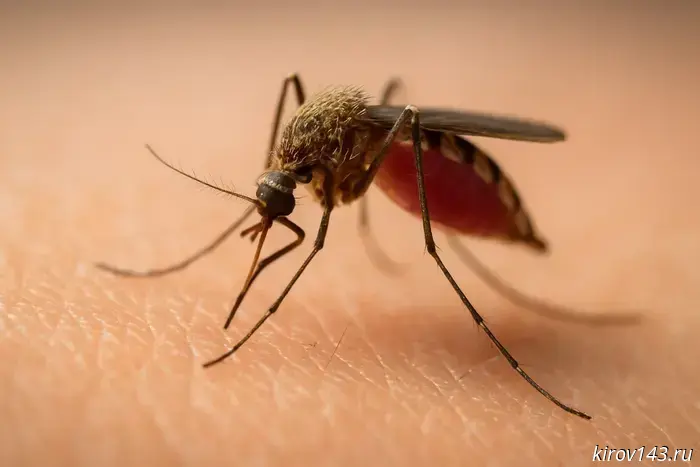
Laws of attractiveness: why mosquitoes bite you
Who has the hardest time avoiding bites?
Mosquitoes are tiny but extremely persistent insects that can ruin a picnic or an evening at the dacha. The question of why they choose some people more than others remains the subject of scientific research.
According to Ulyana Vladimirovna Makhova, an assistant at the Department of Polyclinic Therapy of the Institute of Clinical Medicine, Pirogov University of the Russian Ministry of Health, there are several factors that determine a person's attractiveness to mosquitoes.
Body chemistry: smell, heat and breathing
The main signal for mosquitoes is the chemicals released by our bodies.
The smell of skin and sweat makes some people particularly noticeable. Warm skin and faster breathing draw more attention from the insects.
Those who have consumed alcohol receive even more attention — it raises body temperature. And the emission of ethanol additionally attracts mosquitoes.
The role of heredity
Genetics also plays a role. Some studies show that mosquitoes more often choose people with certain blood types.
Thus, people with blood group A (II) may be more “tasty” to them than those with group O (I) or B (III). This is related to differences in blood composition.
However, even with such a predisposition the risk can be reduced — by using repellents and proper skin care.
The influence of diet and activity
Diet and lifestyle also affect one’s “attractiveness” to insects. Foods rich in vitamin B (garlic, avocado) may reduce mosquitoes’ interest, although this requires scientific confirmation.
Physical activity, however, increases the release of carbon dioxide and lactic acid, which makes a person an especially tempting target.
When should you be concerned?
A typical bite causes itching and redness that subside in a couple of days. But there are warning signs that require a doctor's consultation:
severe swelling and inflammation;
fever, chills;
dizziness, nausea, weakness;
difficulty breathing or chest tightness;
a widespread rash.
Dangerous diseases transmitted by mosquitoes
Although in most cases a bite is only a nuisance, insects can carry serious infections:
malaria (more common in the southern regions of Russia),
dirofilariasis (typical for animals but also occurs in humans),
Western European fever (rare, but recorded in Russia).
So it's better not to take risks and to use all possible preventive measures.
It turns out that, in any case, mosquitoes do not bite “just because” — their choice is influenced by smell, skin warmth, breathing, genes and habits. But we can reduce the risk: use repellents, wear covering clothing, maintain hygiene and pay close attention to how the body reacts. And with serious symptoms you should not postpone a visit to the doctor.
Другие Новости Кирова (НЗК)
 44 million will be allocated for the improvement of Theatre Square.
The work will cover not only the square itself but also the surrounding areas.
44 million will be allocated for the improvement of Theatre Square.
The work will cover not only the square itself but also the surrounding areas.
 The Bank of Russia issued a commemorative coin to mark the Year of the Defender of the Fatherland.
On August 18, a new 50-ruble commemorative coin dedicated to the Saur-Mogila memorial complex entered circulation.
The Bank of Russia issued a commemorative coin to mark the Year of the Defender of the Fatherland.
On August 18, a new 50-ruble commemorative coin dedicated to the Saur-Mogila memorial complex entered circulation.
 Malmyzh Central District Hospital received 16 more units of medical equipment.
The hospital has already received more than 40 pieces of equipment as part of the national project "Long and Active Life".
Malmyzh Central District Hospital received 16 more units of medical equipment.
The hospital has already received more than 40 pieces of equipment as part of the national project "Long and Active Life".
 Oleg Valenchuk: the "Let's Decorate the Motherland with Flowers" contest transforms Vyatka and unites people
Summer is in full swing, and the flowerbeds are shining with bright colors, inspiring residents to actively participate in the flower competition that has been organized for more than ten years by State Duma deputy and Chairman of the Union of Gardeners of Russia Oleg Valenchuk. Photographs and videos of the transformed courtyards are being widely shared on social media, serving as a vivid testament to public enthusiasm.
Oleg Valenchuk: the "Let's Decorate the Motherland with Flowers" contest transforms Vyatka and unites people
Summer is in full swing, and the flowerbeds are shining with bright colors, inspiring residents to actively participate in the flower competition that has been organized for more than ten years by State Duma deputy and Chairman of the Union of Gardeners of Russia Oleg Valenchuk. Photographs and videos of the transformed courtyards are being widely shared on social media, serving as a vivid testament to public enthusiasm.
 The first batch of flu vaccine for adults has arrived in the Kirov region.
Almost 68,000 doses were delivered to the region.
In September the Eternal Flame will be lit at Marshal Konev Square.
The government explained how work to improve the square is progressing.
The first batch of flu vaccine for adults has arrived in the Kirov region.
Almost 68,000 doses were delivered to the region.
In September the Eternal Flame will be lit at Marshal Konev Square.
The government explained how work to improve the square is progressing.
Laws of attractiveness: why mosquitoes bite you
Why do some people become mosquitoes' preferred targets while others hardly notice their presence? Science already knows what influences the choice of one victim over another. Let's look at which factors make you especially attractive to mosquitoes — and what to do about it.
